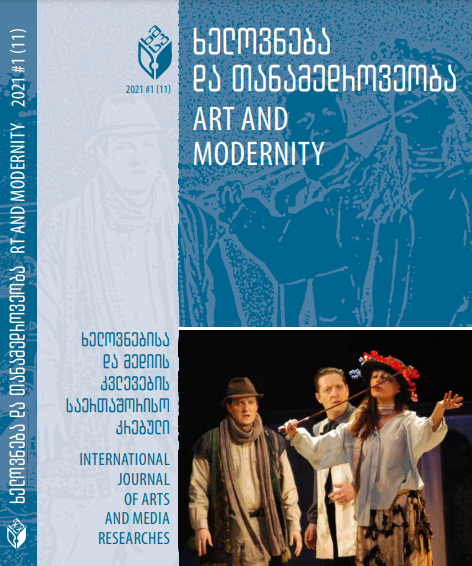Composer’s Creative Will and Scientific and Technological Progress (საკითხის დასმის წესით)
Main Article Content
Abstract
Due to the pandemic of COVID-19, most of the world has chosen remote-teaching and working regimes; except for the reason to avoid heavy social results, what was the use of three fundamental principles against the pandemic (social distance, quarantine, isolation), we shall see the answer to this in the strategy of the political and economic processes of the “New World Order.” It is possible that this far-fetched action aims at the concentration of the mankind’s cognition onto the technological progress and at the generation of the informative and technological progress in its mind. In order to analyze the psychological and economical results of the pandemic, there have been intensifi ed the sociological questionnaires; There is tested the adequacy of the mankind in response to similar
dangers, and this makes us think that the world gets ready for the active “intervention” during the epoch of information technologies. The human cognition and the art processes connected to it have always been developing in rapid succession to the scientifi c and technological progress and the changes in the social formations, though, these links have been much better masked until the twentieth century. To the question, whether the scientific and technological progress would cause the rejection of fundamental values of the musical art after the above-mentioned
process enters its intensive phase (in the epoch of conquest of the interplanetary space), the answer was generated yet in the twentieth century. The unprecedented technological progress has made the greatest infl uence on music exactly in this century
(which still remains actual), but it is also the fact that the musical art which has switched to the road of secularization, has turned again actively to the mysticism, mythological and religious sets of themes in this mentioned century. Along with theoretical
advances, the practical steps towards the assimilation of space has further emphasized the mystery of the boundlessness of the universe, thus increasing the ontological depth of the opuses,
have revealed the charismatic contents of the ideas integrated into them, have strengthened the intensiveness and the area of manifestation of the “mystical.” The music, after all, proceeding
from its specifics, is able to convey the essence of mysticism in depth (starting from the antique epoch, philosophy, esthetic essays, letters of Christian fathers, psychological and even sociological literature, all of the above-listed branches of human activities consider this ability of music). That is why
the scientifi c and technological progress does not collide with the intuitive creative process with the aspiration towards the mysticism typical for it. The technological century has again activated the process of disenchantment (Weber) and the “Space of music,” too; the planetary cognition, too, incorporated into the opuses, has been widened; and still, against the background of the cascade of technological innovations, many questions connected with the future of music are pierced with a visionary’s
curiosity: what will the musical melosphere itself be like (Zemtsovksy), will there occur a rethinking of the phenomenon of the musical audience or that of the listener, what opportunities are open for the composing experimentation at the level of idea
or at the level of stylistic thinking; how will the transcendent or ethical function of music will be changed; what will it be like, the relationship of information technologies with the creative will, etc.
